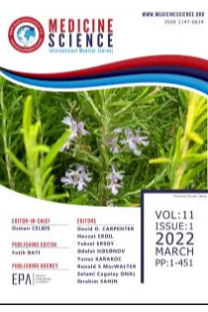Eating disorders and related factors of individuals who applied to the diet outpatient clinic of Turgut Ozal Medical Center
Eating disorders and related factors of individuals who applied to the diet outpatient clinic of Turgut Ozal Medical Center
___
- 1. Ulaş B. Attitudes and behaviors of the personnel working in Malatya military hospital in 2007 on healthy nutrition. Master thesis, Inonu University, Malatya, 2008.
- 2. Ulaş B, Pehlivan E. Hemoglobin A1c Screening and Potential Eating Disorder Prevalance in University Students Medicine Science. 2015;4:2196- 209
- 3. Ozyazgan AA. Healthy lifestyle behaviors, eating behavior disorders and affecting factors in individuals who applied to the diet outpatient clinic of Elazig Training and Research Hospital to lose weight. Master thesis, Inonu University, Malatya, 2016.
- 4. Avan Z. Evaluation of the nutritional status and body perception of individuals between the ages of 18-30 attending a private sports center. Master thesis, Baskent University, Ankara, 2015.
- 5. Ozcelik AO. A research on the nutritional habits of health personnel. Food. 2000;25:93-9.
- 6. Ilhan MN, Özkan S, Aksakal FN, et al. The frequency of probable eating disorders in a medical school student. Psychiatry in Turkey. 2006;8:151-5. 7. Kavas AB. Eating attitudes and depression in a Turkish sample. Eur Eat Disord Rev. 2007;15:305-10.
- 8. Tepe SO. Determination of orthorexia nervosa and eating attitudes of individuals who diet through social media: an example of instagram. Master thesis, Inonu University, Malatya, 2019.
- 9. Wong Y, Lin JS, Chang YJ. Body satisfaction, emotional intelligence, and the development of disturbed eating: a survey of Taiwanese students. Asia Pac J Clin Nutr. 2014;23:651-9.
- 10. Ünsal A, Tozun M, Ayrancı U, et al. The prevalence of probable eating disorders and related factors in high school students in a town in western Turkey. Dirim Med J. 2010;85:110-2.
- 11. Mulders-Jones B, Mitchison D, Girosi F, et al. Socioeconomic correlates of eating disorder symptoms in an Australian population-based sample. PLOS ONE. 2017;12:1-17.
- 12. O'Brien KM, Whelan DR, Sandler DP, et al. Predictors and long-term health outcomes of eating disorders. PloS one. 2017;12:1-14.
- 13. Erol A, Toprak G, Yazıcı F. Factors predicting eating disorders and general psychological symptoms in university student women. Turk J Psychiatry. 2002;13:48-57.
- 14. Nadjarzadeh A, Vaziri N, Imanesh AM, et al. Assessment of the eating disorders in female students of Shahid Sadoughi University of Medical Sciences, Yazd, Iran. J Community Health Res. 2012;1:79‐84.
- 15. Liao Y, Knoesen NP, Castle DJ, et al. Symptoms of disordered eating, body shape, and mood concerns in male and female Chinese medical students. Compr Psychiatry. 2010;51:516–23.
- 16. Uskun E, Şabaplı A. The relationship between high school students' body perceptions and eating attitudes. TAF Prev Med Bull. 2013;12:519-28.
- 17. Kadıoğlu M, Ergün A. University students' eating attitude, self-efficacy and influencing factors. MUSBED. 2015;5:96-104.
- 18. Geliebter A, Aversa A. Emotional eating in overweight, normal weight, and underweight individuals. Eat Behav. 2003;3:341-7.
- ISSN: 2147-0634
- Yayın Aralığı: 4
- Başlangıç: 2012
- Yayıncı: Effect Publishing Agency ( EPA )
The association between vitamin D and Hashimoto’s thyroiditis
Baris Onder PAMUK, Gulseren Pamuk, Figen Narin, Cevdet Guzelsagaltici, Umit Cavdar, Alperen Ihtiyar
The effect of vitamin D deficiency in patients with trigeminal neuralgia: A case control study
Duygu Demiroz Aslan, Mahmut Durmus, Neslihan Altunkaya Yagci
The suicidal deaths in Isparta: A 10-year retrospective autopsy study
Abdulkadir Yildiz, İBRAHİM EROĞLU, Erdinc Cayli, Özge Savcı
Tugba Cetinkaya, Muhammed Mustafa Kurt
The effects of some characteristics of women and menopause symptoms on menopausal attitude
Ummuhan Akturk, Sumeyye Yagmur
Determination of the prevalence of dental anomalies by digital panoramic radiography analysis
Neslihan Yilmaz Cirakoglu, Mihriban Gokcek
Duygu Demiroz Aslan, Ayse Gul Ferlengez, Neslihan Altunkaya Yagci
Mehmet Turan Cicek, Mehmet Aslan
Macit Koldas, Selda Mercan, Zeynep Turkmen, Ozgur Sogut, Nihan Doğusan Gokce, Murat Yayla, Munevver Acikkol
